#catch up with pat
Text
Pain, Trust, and Separation in Some Asian Dramas (The Second Post In a Series of Utterly Un-scholastic, Highly Personal Big Meta)......
AKA, Turtles Catches Up With Old GMMTV: The Bad Buddy Rewatch Edition, Part 2 -- How Themes of Pain, Trust, and Separation Create Structure and Narrative in Bad Buddy and Other Asian BLs
[The following is a preamble I use for my Old GMMTV Challenge posts, here we go! What’s going on here? After joining Tumblr and discovering Thai BLs through KinnPorsche in 2022, I began watching GMMTV’s new offerings -- and realized that I had a lot of history to catch up on, to appreciate the more recent works that I was delving into. From tropes to BL frameworks, what we’re watching now hails from somewhere, and I’m learning about Thai BL's history through what I’m calling the Old GMMTV Challenge (OGMMTVC). Starting with recommendations from @absolutebl on their post regarding how GMMTV is correcting for its mistakes with its shows today, I’ve made an expansive list to get me through a condensed history of essential/classic/significant Thai BLs produced by GMMTV and many other BL studios. My watchlist, pasted below, lists what I’ve watched and what’s upcoming, along with the reviews I’ve written so far.Today, I offer the second of four posts on Bad Buddy, and the second in a Big Meta series on pain in some Asian dramas, including QLs and/or het romances. I'll look today at how ideas of pain in love, trust in love, and separation of partners/family members creates narrative drive in Bad Buddy and other Asian BLs. THIS IS A LONG POST, caveat emptor.]
Links to the BBS OGMMTVC Meta Series are here: part 1, part 2, part 3a, part 3b, and part 4
Well, after a lot of titles and a chewy preamble (thank you for getting through that, y'all!), I'm here to say that I'm combining my two ongoing meta series into one big ol' post here that I've been dying to write for months. In the course of my watching the shows on the Thailand-based Old GMMTV Challenge watchlist, as well as watching shows from my BL gateway of Japan, I've noticed that the themes of pain and trust in love, along with voluntary or involuntary separation, have been used to create dramatic and narrative structure within Asian dramatic stories to many emotional effects.
I'm celebrating the incredible Thai BL drama that is Bad Buddy in my OGMMTVC series at the moment, and within my Big Meta series on pain in Asian dramas, I examine how themes of pain so very often harken back to artistic, and even traditional, viewpoints of how pain, suffering, and melancholy are natural cultural assumptions within many collectivist Asian societies. In my first Big Meta on pain and suffering in Asian dramas, I wrote that "accepting pain and suffering is a part of the life we decide to live, from an Asian cultural perspective." Suffering is a naturally assumed part of life, a very distinct and identified part of a Buddhist's lived life, and even outside of Buddhism, accepting and living with difficulties of all kinds -- wealth disparities, the struggle for a good education and/or a successful career, the struggle to conform to collectivist familial and/or social expectations, etc. -- are extremely common themes that are unwound on in Asian lives on a minute-to-minute basis. The idea that an Asian must live with pain is often a root of intergenerational trauma, passed along from generation to generation of Asian children-to-adults. The social mores by which Asians are raised and live, to assume what Westerners might call a lack of unconditional parental love and affection, are certainly in part rooted in an assumption that living with pain and without the, say, luxury of turning over one's emotions at any given moment, are an automatic given.
As I've plodded through the OGMMTVC watchlist, I noticed very often that separation of people -- whether those people are lovers, children/parents, or simply just adults within a group -- is often a major narrative turning point in the course of a dramatized relationship. Of course it would be; it's a common trope within the romance genre, for instance.
But I find the separation of people otherwise connected to each other -- and the assumed pain of that separation, and the trust that people may have to return to each other -- particularly fascinating within the realm of Asian dramas, for reasons relating to the assumption of pain and suffering in one's life within Asian cultures that I mentioned above. In other words, the pain of separation, and the trust that one might have that one person will come back to another person -- are givens within the scope of Asian life.
In the following dramas, I note that separation is either a central storytelling point, or is a central focus of side characters:
1) The Thai filmmaker, Aof Noppharnach, has explored separation of people/lovers in many of his shows, including Still 2gether, A Tale of Thousand Stars (in multiple forms), and in Bad Buddy (also in multiple forms, romantic and/or familial).
2) Also from Thailand, Until We Meet Again and I Promised You The Moon are two non-GMMTV dramas in which separation of lovers plays an important concluding narrative role.
3) From Japan, the movie version of Cherry Magic: 30 Years of Virginity Can Make You a Wizard?! captures an important central narrative of separation that leads the franchise's two protagonists, Adachi and Kurosawa, to explore depth in honesty and intimacy that they may not have otherwise achieved in their everyday lives.
The painful separation that occurs in Aof Noppharnach's shows is most often related to the outside forces of life as it needs to be lived -- very often economically -- within or external to Thailand. In Bad Buddy, Pran leaves for Singapore for two years. I'm going to unwind much more on Pran leaving for Singapore in the final installment of my Bad Buddy OGMMTVC meta series, particularly by way of how he can do it, emotionally. But I want to offer a quick note about Pran's departure that the show gives a hint to (despite the pain that we feel in our hearts for Pat's loneliness from Pran, as depicted so beautifully by Ohm Pawat and his silent and longing existence as Pat in the first half of the Bad Buddy series finale). The BBS finale has Pran stating that he'll only be away for two years, and that the pay and the opportunity for an excellent architecture job were better in Singapore. In conversation with the fabulous Thai blogger, @recentadultburnout, RAB mentioned that this is a common occurrence among young Thais -- to move overseas for better job opportunities.
In spite of my heart breaking a bit for Pran being away from Pat when I first learned about his leaving for Singapore -- when RAB put Pran's departure in that context, I had to slap my cheek a bit. Because! I'm a child of Asian immigrants. Separation from family for better economic opportunities is a HUGE part of our paradigm of life between continents. As my Asia-based uncle, my mother's brother, once put it, in regards to my mother: "one of the children in our families always had to move away." For my mother's family, it was my mom who shipped off. Besides individuals seeking better economic opportunities for themselves, the economies of many Asian countries are dependent on the reception of remittances from overseas family members sending money back to their home countries, as my mom did for years; the Philippines is particularly notable for having a nearly 9% contribution from overseas remittances to its gross domestic product. In other words? The separation of loved ones is literally built into the financial frameworks of many Asian nations.
The separation of children or partners to overseas locales for the sake of better salaries and/or opportunities is simply a more assumed part of the cultural paradigm, I'd argue, in Asia than in the West. Family separations for jobs are extremely common in Asia; in the West, I'm not sure they are as assumed, especially for extensive separations, as the value placed on keeping a family unit together for cultural or spiritual reasons seems to be more a part of the Western fabric of life (despite our high rate of divorce).
We see an even more permanent economic separation happen in Still 2gether between two side characters -- Type, played by Toptap Jirakit, who is Tine's (Win Metawin) brother, and Man (Mike Chinnarat), who is Sarawat's (Bright Vachiwarit) friend. Man chased after Type during the first 2gether season; in Still 2gether, they're navigating their committed relationship, as Type contemplates, then accepts, a permanent job offer in Phuket, hours away from their home base in Bangkok.
As @lurkingshan put it, I might be the only person on the planet contemplating Type's and Man's relationship (lmao, it do be true), but I found Type's last conversation with Man, on the beach, to be particularly direct and moving for someone who has no immediate plans to move back to the side of the person he's dating.
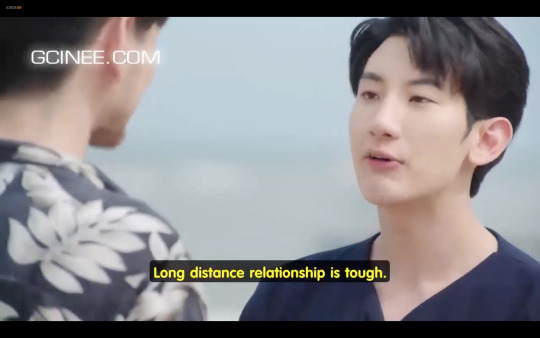
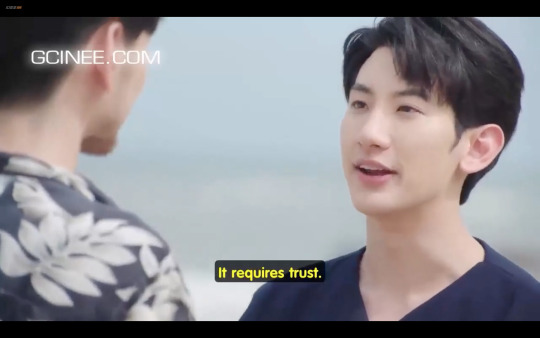
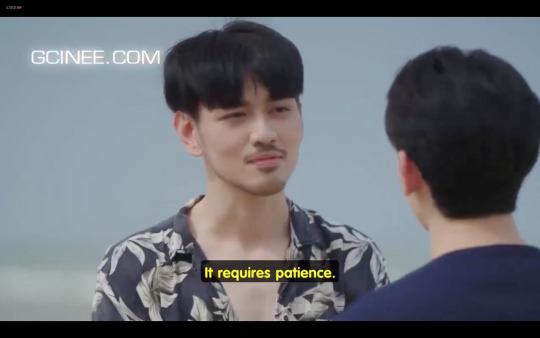
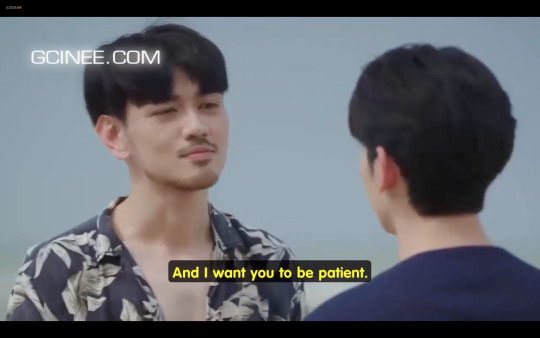

I think about this scene against the structure of the short series that is Still 2gether, which is centered around the protagonists of Sarawat and Tine being temporarily separated as they prepare to compete in a university-wide tournament. Sarawat has the most lovely contemplation on love during this separation, and even Aof Noppharnach himself admits that the glance that Sarawat and Tine give to each other as they pass each other in the lead-up to the ultimate tournament is his favorite scene he's ever filmed (!!!) (and that scene is sooooo reminiscent of Pran's and Pat's pinky-hold after their public "break-up").
In other words: Still 2gether is ALL about separation, and contemplating the strength of love relationships in the face of those separations. While Sarawat and Tine will get back together, after that tournament -- Type and Man are separated for the foreseeable future. There is no end indicated to the patience that Type wants from Man. The conversation is just, THERE, and hanging -- there's an acknowledgment that long-distance relationships are tough, but Type isn't offering to quit his job and move back to Bangkok. Instead, Type and Man are left to accept the reality that there is no end in sight to their separation.
And I think this was incredibly bold of Aof Noppharnach to include in a GMMTV BL that otherwise ended happily for Tine and Sarawat, the main protagonists. What I admire about Aof's works are these sly inclusions of open-ended, sometimes melancholy non-resolutions, either for his main or his support characters, that leave us as viewers often slightly unsatisfied or unfulfilled. He did this in particular with the character of Aof in Gay OK Bangkok, a web series that he screenwrote in 2016; and many might say that Pran being away in Singapore is also not the most satisfying of endings for our beloved PatPran in Bad Buddy. To me, these decisions to do this artistically are just incredibly reminiscent, again, of the kind of pain that we as Asians have been culturally attuned to accept, for the sake of economics, and/or for the sake of the betterment of our loved ones.
Besides economic separations in Aof Noppharnach's works, we also have separations related to family demands and desires. In A Tale of Thousand Stars and Our Skyy 2 x A Tale of Thousand Stars, we see Tian leaving Phupha's side for two years to study for a graduate degree at Tian's mom's insistence; and we see Phupha refusing to join Tian, after Tian has graduated and moved back to Pha Pun Dao, on trips Tian takes back to Bangkok to celebrate his birthday with his parents.
When I rewatched ATOTS earlier this year, I noted that both Phupha and Tian were remarkably bad communicators throughout the original series -- and I posited that, in large part, their terrible communication was borne out by way of the both of them being raised in traditionally masculine Asian households that seemed to not allow for leeway regarding emotional revelations. BOTH Phupha and Tian were expected and intended to follow in the footsteps and demands of their family members. To the end of the ATOTS storyline in Our Skyy 2, Phupha brings up his parents -- and he hears what he has been wanting to confirm from Tian's parents, in their desire to have Phupha take care of Tian for the rest of their lives.
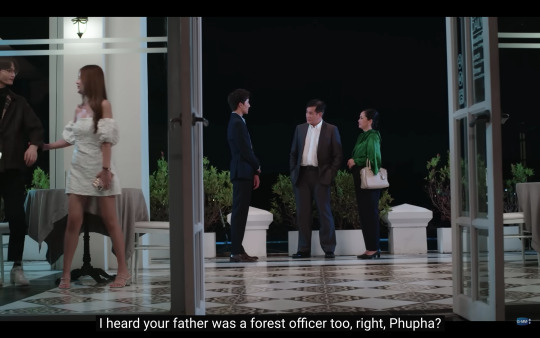

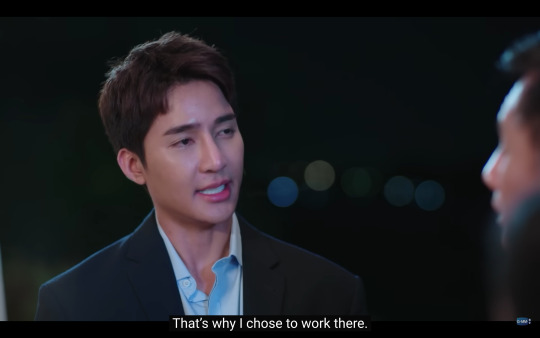
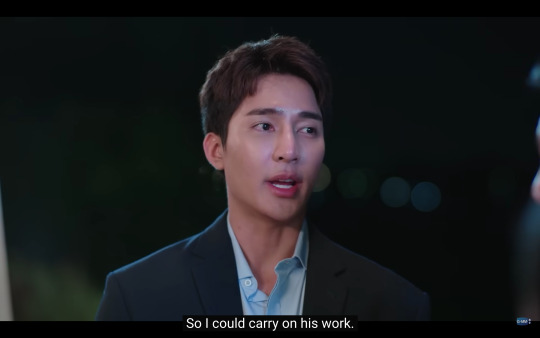
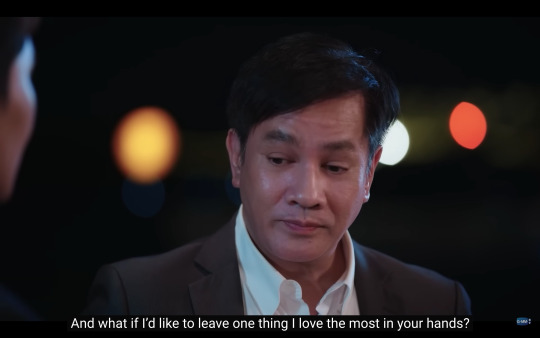
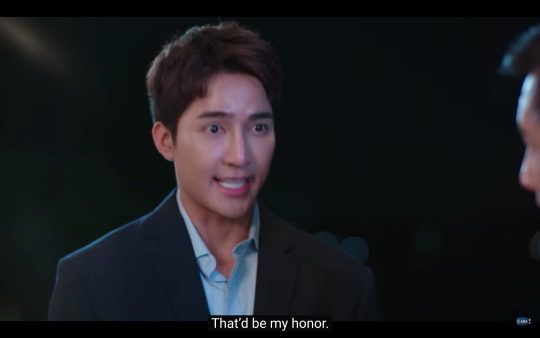
Phupha in particular needed to have multiple gateways opened to him, vis à vis Tian's family, in order to properly and openly confirm his permanent love and commitment to Tian. If Phupha didn't have that? He was willing to be separated from Tian, either temporarily, or at length. Phupha needed a kind of culturally accepting door opened to him -- as a man raised in what we assume to be a rural and traditional environment that may very well have not allowed for a gay man to live openly and honestly. Phupha indeed follows in his father's footsteps, to the extent of never leaving Pha Pun Dao, and demanded that he have Tian's family's approval before making the final commitment to Tian to love Tian forever.
I find the cultural nuances of nuclear family separation, or separation encouraged by nuclear family, to be particularly heartbreaking in many of Aof Noppharnach's works. We know that Jim and Jam, brother and sister in Moonlight Chicken, ran away from their Isan hometown as youths to find their lives in Pattaya, where we meet them in the context of that show. But separation either from nuclear family, or more impactfully, done by nuclear family, is most evident in Bad Buddy.
Besides Pran voluntarily leaving for Singapore, we know that Pran has been involuntarily separated from Pat before -- when Pran was transferred to a boarding school in 10th grade by his mother, Dissaya. Before that transfer, Pran and Pat were technically "separated" by their parents in so far as they were not supposed to become friends -- all while competing heavily against each other in every category of life.
That boarding school transfer? That wasn't just separating Pran from Pat. What I found remarkable about that separation during my recent BBS rewatches is that Dissaya HERSELF chose to be physically separated from her own son, for the sake of her rivalry with Pat's father, Ming.
I'm thinking about this particularly from the words she used with Pran as they sat at breakfast together before Pran started his second year at university, when Dissaya said that Pran could date anyone, men or women, as long as he "didn't date [the next door kid]."
My interpretation of that perspective is that Dissaya did not want Pran to relieve the heartbreak that she herself experienced when she was close with Ming in her teenage years.
In other words: she chose to send her son away in the face of her ongoing, lifelong fear that Ming and his family would once again wreak havoc on her and her clan.
In the continuation of the intergenerational trauma wrought upon Pat and Pran by their parents -- as a mother myself, this seems to be particularly egregious. Dissaya would have rather had her son AWAY FROM HER, than to contemplate her son even being WITHIN physical proximity to Pat in the context of her hatred of Pat's father, Ming, and the fear that she had that the Jindapats would negatively influence the Siridechawats again.
(The wonderful @telomeke reminded me, in conversation on this topic, that the first question Dissaya asks Pran, after learning about the first faculty fight in episode 1 when Pran re-encounters Pat for the very first time, was, "Did he hurt you, Pran?" Dissaya cannot bear to allow the Jindapats to hurt her son, or her family, ever again.)
I wrote in my first Big Meta on pain and suffering that Asian parenting expectations and mores are far more conditional than they are in the West, as parenting mores in the West are centered around unquestioned and unconditional love from parents to children. So much of Bad Buddy meta out there focuses on the internal experiences of Pran and Pat. When I sat back to think about Dissaya making the decision for herself to be separated from her son for years -- and then to also contemplate pulling Pran FROM COLLEGE when she learns that Pat goes to Pran's university -- I mean. We know Dissaya and Ming both tried their best to embody their hatred of each other into their children. But Dissaya takes it a couple steps further, by attempting to literally control Pran's physical existence vis à vis Pat, which -- and I'm going to sound like a judgmental Westerner here, even as an Asian -- strikes me as out of line by way of just pure emotional projection onto one's children.
When Pran goes to Singapore, at the end of the series, it's out of his own volition. Again, I'll write more about this at the end of my BBS OGMMTVC meta series. But what he experienced by ways of many TYPES of separation from Pat throughout his life -- competitively, emotionally, and then physically -- are extensive. He was physically separated from Pat by Dissaya. He was theoretically "separated" from Pat emotionally, by being discouraged in having a friendship with Pat. He is physically separated from Pat *again* when he goes to Singapore. And I posit later in this piece that Pat and Pran had another theoretical "separation" when they are pretending to be broken up throughout the course of their relationship.
When I think about what teenage Pran must have felt to be *physically sent away* -- BY and FROM his own family, for their sake of his family's desires to avoid ANOTHER family -- it explains a hell of a lot more about Pran's tendency to dissociate, particularly during stressful times. (We see this when he's alone at the demolished bus stop, and cutely in Our Skyy 2, as Pat encourages a grumpy Pran to go to Pha Pun Dao.)
And where Pat balanced Pran out -- where Pat could offer the kind of companionship, and relaxed and equitable communication that Pran had never had with his family -- was where Pran could finally experience truly open and SAFE love from and with another person, another person who wouldn't *send him away* if Pran didn't play by their rules. Instead, Pat fought by Pran's side, and Pran was willing to fight, too, and they remained together, and safe in their love and trust.
Whew. Dissaya separating Pran from his own family, from herself -- to leave him alone at boarding school -- seriously punches me in the gut, especially as a mother myself. I'm thinking about a teenager, on the cusp of adulthood, alone to contemplate his unending love for Pat, and I'm like.... I wouldn't leave a kid alone like that for a moment. But for Dissaya, her husband, and their pride? It seemed to be a worthwhile decision in that moment. A decision that we know would blow up in their faces in episode 10 of Bad Buddy.
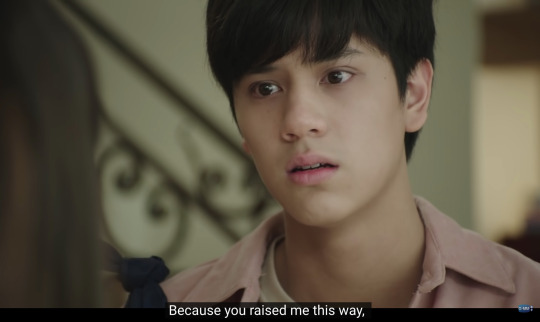
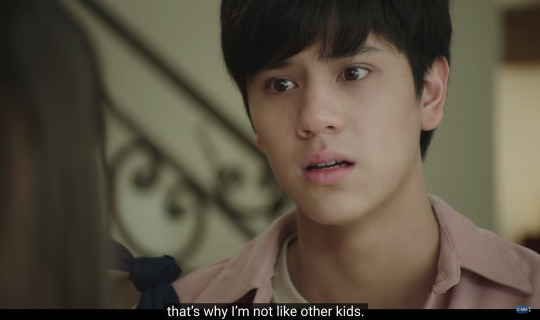
In Pran's first separation from Pat -- Pran did not have personal agency. He did have agency later on, as he moved to Singapore, which again, I'll contemplate in a further meta.
Two instances where I was impressed by protagonists leveraging their agency vis à vis temporary separations from their partners was in Until We Meet Again and in I Promised You The Moon.
UWMA's Pharm was first and foremost presented as a blushing maiden. HOWEVER: Pharm demonstrated quite a bit of sexual agency early in the series. He was forward in his crush on Dean. He contemplated openly being gay. And he wasn't afraid to push Dean away when Dean was moving too fast sexually.
At the end of the series, after Dean and Pharm have resolved their spiritual connection vis à vis the embodied spirits of Korn and Intouch meeting once more -- Pharm wants to know if the love between him and Dean is real, and independent of the influence of the spirits of Korn and Intouch. So: Pharm asks for a break.
Throughout UWMA, Dean is the obvious seme, and Pharm is the blushing uke. I squealed in DELIGHT when I first watched Pharm asking for the break. Yes, Pharm loved Dean -- and what I saw in Pharm's asking for a temporary separation was truly out of that love, to confirm between the both of them that their relationship was very much indeed a forever relationship. God, I get chills thinking about it: Pharm was safe enough in his sphere with Dean to ask for and to GET the agency-driven space that HE NEEDED to feel fully confident in the relationship. That was a risky move that paid off for the two guys in dividends in the end. Dean had no choice but to say yes there.
The fabulous Oh-aew in I Promised You The Moon goes even further than Pharm. He fucking breaks up with Teh! After Teh cheated on Oh-aew! YES, HOMEY, YES! No wibbling on Oh-aew's end. Oh-aew was devastated, yes. But he knew he had to have Teh out of his life in that moment, for the sake of Oh-aew's own happiness, growth, and development. He even rejects Teh's reach-out at the end of their college careers.
What stuck me as so golden about the ending of IPYTM was that that break-up wasn't actually presented as temporary. They were apart for OVER A YEAR (thank you kindly to @shortpplfedup for the temporal fact-check!). Oh-aew held his ground. He needed his time and space. He needed to grow! And he valued that, individually.
I'm celebrating these two instances of agency-driven separations because of the style of their intention vis à vis the protagonists asking for, needing, and leveraging these separations. With the economic and involuntary separations I talked about earlier -- it's like there was a higher need, whether it was for money, a better career opportunity, fear, or selfishness on the part of a family to create the separation.
With Pharm and Oh-aew: the separations they demanded were purely personal and for their own growth. We know now that Pharm and Oh-aew get their endings with their partners. Pharm has a purely happy ending with Dean in Between Us. Oh-aew's ending with Teh is open-ended -- we don't know what chaos Teh will wreak next -- but at least we know they're navigating that chaos together again.
The last drama I wanted to take a look at regarding pain, trust, and separation is the fabulous movie continuation of Cherry Magic: 30 Years of Virginity Will Make You a Wizard?! (I always love writing ?! whenever I talk about Cherry Magic, lol).
The central separation in the movie of the two protagonists, Adachi and Kurosawa, comes about when Adachi is transferred to Nagasaki for work. As @neuroticbookworm and @lurkingshan can attest to: a Western viewer of Japanese BLs will often find themselves screaming to a screen, "JUST TALK ALREADY!," and a uniquely common aspect of Japanese doramas is that so much of communication in Japanese culture is silent, unsaid, kept internal by collectivist social pressures to not make waves with another person -- which automatically creates ongoing questions of trust between partners. When Adachi (Akaso Eiji) shares with Kurosawa (Machida Keita) that Adachi will be moving, Kurosawa shares in words that he's happy for Adachi, but through very simple body language, communicates that he is feeling otherwise.
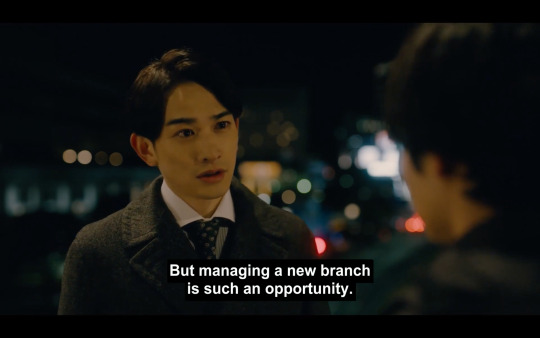
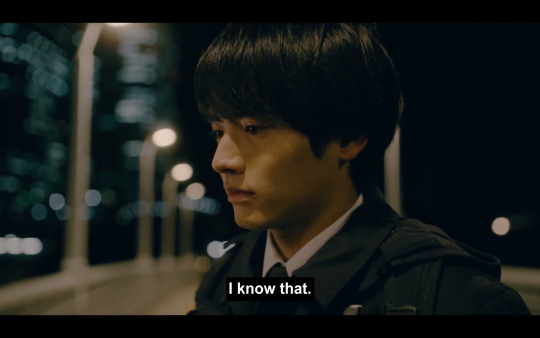
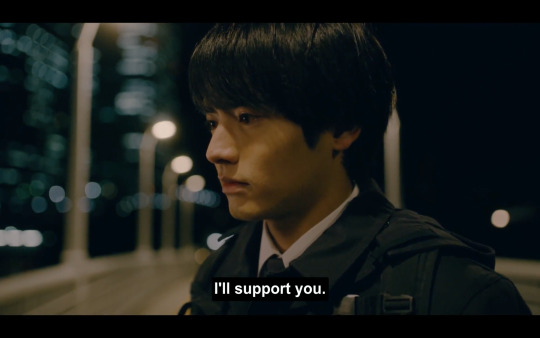
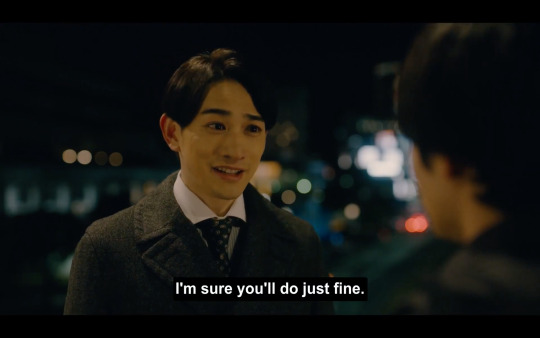
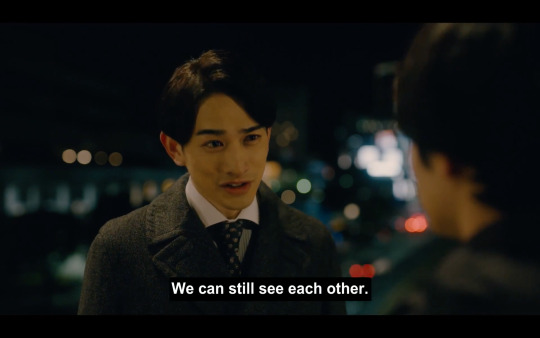
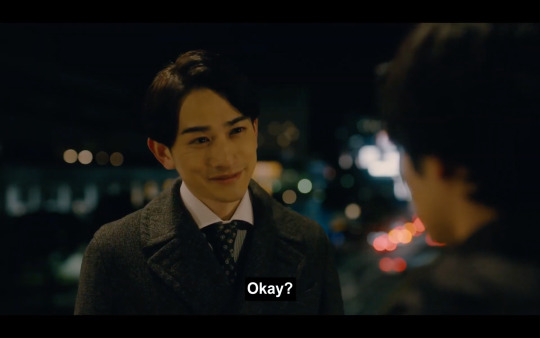
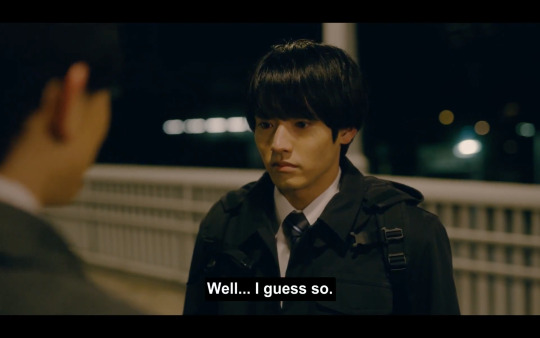
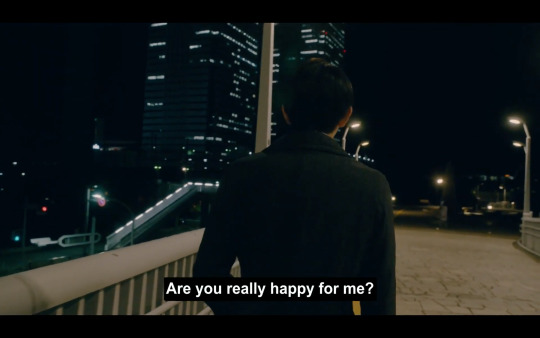
Later in the movie, Adachi gets into an accident in Nagasaki, and Kurosawa rushes to be by Adachi's side. Kurosawa is clearly traumatized. And Kurosawa finally reveals his feelings about the entire situation -- a rare display of direct emotional confession.


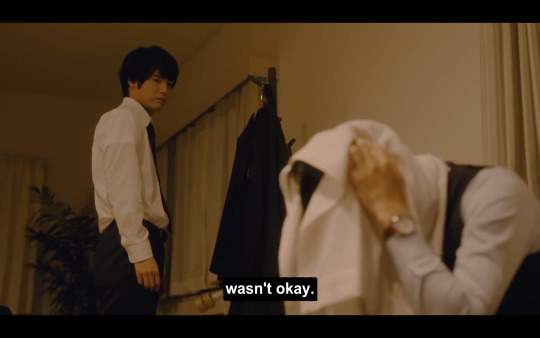
We think that Adachi moved to Nagasaki for this job opportunity -- separating himself from the incredibly devoted and head-over-heels-in-love-with-Adachi Kurosawa. Adachi knows well enough that Kurosawa is suffering in this separation. But later in the movie, after Adachi has moved back with Kurosawa, do we learn Adachi's true intentions. Adachi wants to make himself invaluable at work -- so that Adachi's and Kurosawa's shared company will not separate them if the company finds out about their relationship.
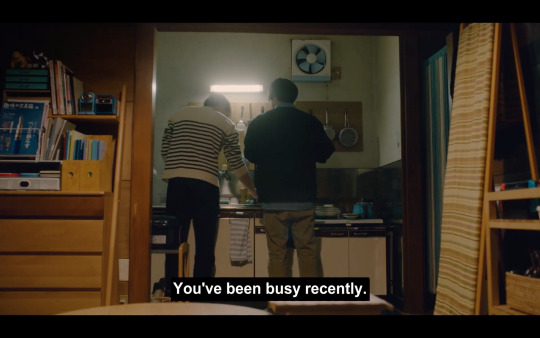

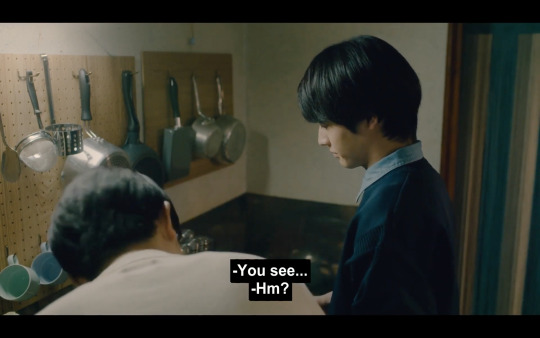
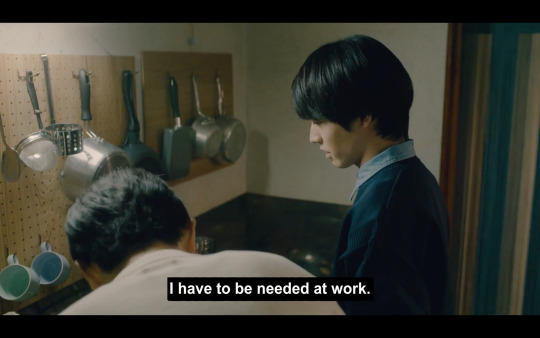

This particular conversation between Adachi and Kurosawa -- after their separation, after they've moved in together -- is a huge turning point in the movie for Adachi, who had usually been the reluctant uke in their relationship prior to this moment. In this conversation, Adachi expresses his fear that outside forces will eventually separate them, and he wants to do what he can to ensure the safety of their relationship.
To me, this is incredibly reminiscent of the compromises Pran and Pat make in Bad Buddy to keep their relationship secret -- another theoretical "separation" -- from their parents for the health, safety, and viability of their relationship.
As well, this conversation between Adachi and Kurosawa moves forward into Adachi's desire to come out to their families. He was inspired by the immediate aftermath of the accident, in which Kurosawa was the last person to find out that Adachi had gotten hurt -- only after Adachi's family and company were notified.
The nuances of this separation between Adachi and Kurosawa -- and what the separation LED TO, which was an eventual and permanent commitment between Adachi and Kurosawa -- are incredibly layered. Adachi made an economic separation from Kurosawa. But it was also rooted in his desire to acclimate his company to his company's dependence on Adachi, so that the company would choose Adachi's contribution to the company over the potentially taboo reality of his same-sex relationship with a colleague in Kurosawa. In other words: he wanted to leverage the separation and his work performance upon his return, to render the company no choice in choosing Adachi's economic performance over his personal and private choices.
(One insight into Japanese culture is that for decades, Japanese corporations have wanted their employees to be married, to complete a seamless connection between household and "office" families. The Japanese BL Kinou Nani Tabeta?/What Did You Eat Yesterday? makes reference to the fact that the main protagonist, Shiro, becomes an independent lawyer because, as a gay man, he may have been pressured to take a wife in another, more group-oriented corporate setting.)
AND, following this, Adachi wanted to come out to his and Kurosawa's families, to also acclimate them to their relationship, so that their families would also not threaten the sanctity and safety of their relationship. And his gamble worked -- and their families accepted them, and they were able to make a permanent commitment to each other.
Without a strategically economic separation, Adachi and Kurosawa could not have achieved key moments of communication that led to their ability to find safety in their external environments, and make a personal and private permanent commitment to each other. The separation to Nagasaki was Adachi's lever to move their relationship forward.
It's so nuanced, so layered, and so strategic on Adachi's end, to use the work separation and his commitment to his company as such a motivator to propel his relationship forward and permanently with Kurosawa -- especially vis à vis the unique nuances of spoken and unspoken communication in Japanese society, which are remarkably different than the styles of communication we see in Thai dramas.
In Pran's and Pat's conclusion in the Thailand of Bad Buddy, they go in the opposite direction: for the sanctity and safety of their relationship, they act out a break-up scenario (with Dissaya telling Pran, "come back to your family," ha), and keep their committed relationship a secret. And this happens *two years* before the context of an actual, physical separation when Pran decides to move to Singapore after graduation.
It's a bit of a switcheroo from what we'd expect by way of open vs. closed communication between Japan and Thailand. But both scenarios, from Cherry Magic to Bad Buddy, work brilliantly well to ensure that all relationships are safe and solidified.
I'm not sure that I can say, globally, that separation from one's nuclear family, or separation from a partner, are common occurrences in manifested everyday reality. As I mentioned before, the economies of many countries are dependent on the physical separation of their citizens to other locales to send back monetary remittances. But more often than not -- when partners are partnered, they tend to want to stay by each other's sides.
I love that many Asian dramas do not shy away from the many realities as to why partners or children may be voluntarily or involuntarily separated from loved ones. Our beloved dramas show us the devastation of involuntary separations, as rendered by Dissaya unto Pran. We see that economic separations can actually LEAD to a solidifying of relationships in the case of Adachi and Kurosawa. We see that family-motivated separations, in the cause of Phupha and Tian, simply needed the investment of time for their relationship to reach a point of comfortable commitment. We see that agency-driven separations by Pharm and Oh-aew can lead to emotional clarity. And, we see that theoretical, secret-kept "separations," of the kind that Pat and Pran created for themselves, to protect their relationship, were risks worth taking, simply for them to be together and happy.
Pain and happiness are not emotions independent of each other. At least in the eyes of my Asian cultures, human beings embody all emotions, all the time. Humans are certainly primed, internally and socially, to seek happiness and balance. But as I've posited here in this post -- is there pleasure without pain? The pain of separation, the trust that partners and family members can learn from each other through separation, and the lessons and communicative ability to solidify relationships after the obstacles of separation, are all themes of life that, I think, are worth unwinding on, in glorious emotional detail. And I love that our beloved Asian dramas do not shy away from these examinations.
(Tagging @dribs-and-drabbles and @solitaryandwandering by request! If you'd like to be tagged, please let me know!)
[Well, this one was a doozy -- if you got through it all, I thank you! Next up, next week, is another post I've been dying to write for months. I had the opportunity to engage in lengthy conversation with a number of FABULOUS Asian Tumblr bloggers, all of us Bad Buddy stans, to reflect on our experiences as Asian reviewers watching BBS and to talk about what we related to. I have a list, a WHOLE LIST! of themes to expound on. I'm calling it Asian Cultural Touchpoints Within Bad Buddy. And I may need to split it into two posts, because there's a lot to talk about. Join me and my friends next week in our continued Bad Buddy brain-rot sesh!
Here is the status of the Old GMMTV Challenge watchlist. Tumblr's web editor loves to jack with this list; please head on over to this link for the very latest updates!
1) The Love of Siam (2007) (movie) (review here)
2) My Bromance (2014) (movie) (review here)
3) Love Sick and Love Sick 2 (2014 and 2015) (review here)
4) Gay OK Bangkok Season 1 (2016) (a non-BL queer series directed by Jojo Tichakorn and written by Aof Noppharnach) (review here)
5) Make It Right (2016) (review here)
6) SOTUS (2016-2017) (review here)
7) Gay OK Bangkok Season 2 (2017) (a non-BL queer series directed by Jojo Tichakorn and written by Aof Noppharnach) (review here)
8) Make It Right 2 (2017) (review here)
9) Together With Me (2017) (review here)
10) SOTUS S/Our Skyy x SOTUS (2017-2018) (review here)
11) Love By Chance (2018) (review here)
12) Kiss Me Again: PeteKao cuts (2018) (no review)
13) He’s Coming To Me (2019) (review here)
14) Dark Blue Kiss (2019) and Our Skyy x Kiss Me Again (2018) (review here)
15) TharnType (2019-2020) (review here)
16) Senior Secret Love: Puppy Honey (OffGun BL cuts) (2016 and 2017) (no review)
17) Theory of Love (2019) (review here)
18) 3 Will Be Free (2019) (a non-BL and an important harbinger of things to come in 2019 and beyond re: Jojo Tichakorn pushing queer content in non-BLs) (review here)
19) Dew the Movie (2019) (review here)
20) Until We Meet Again (2019-2020) (review here) (and notes on my UWMA rewatch here)
21) 2gether (2020) and Still 2gether (2020) (review here)
22) I Told Sunset About You (2020) (review here)
23) YYY (2020, out of chronological order) (review here)
24) Manner of Death (2020-2021) (not a true BL, but a MaxTul queer/gay romance set within a genre-based show that likely influenced Not Me and KinnPorsche) (review here)
25) A Tale of Thousand Stars (2021) (review here)
26) A Tale of Thousand Stars (2021) OGMMTVC Fastest Rewatch Known To Humankind For The Sake Of Rewatching Our Skyy 2 x BBS x ATOTS (re-review here)
27) Lovely Writer (2021) (review here)
28) Last Twilight in Phuket (2021) (the mini-special before IPYTM) (review here)
29) I Promised You the Moon (2021) (review here)
30) Not Me (2021-2022) (review here)
31) Bad Buddy (2021-2022) (thesis here)
32) 55:15 Never Too Late (2021-2022) (not a BL, but a GMMTV drama that features a macro BL storyline about shipper culture and the BL industry) (review here)
33) Bad Buddy (2021-2022) and Our Skyy 2 x BBS x ATOTS (2023) OGMMTVC Rewatch (The BBS OGMMTVC Meta Series is ongoing: preamble here, part 1 here, and more reviews to come)
34) Secret Crush On You (2022) [watching for Cheewin’s trajectory of studying queer joy from Make It Right (high school), to SCOY (college), to Bed Friend (working adults)] (watching)
35) KinnPorsche (2022) (tag here)
36) KinnPorsche (2022) OGMMTVC Fastest Rewatch Known To Humankind For the Sake of Re-Analyzing the KP Cultural Zeitgeist
37) The Eclipse (2022) (tag here)
38) The Eclipse OGMMTVC Rewatch For the Sake of Re-Analyzing an Politics-Focused Show After Not Me
39) GAP (2022-2023) (Thailand’s first GL)
40) My School President (2022-2023) and Our Skyy 2 x My School President (2023)
41) Moonlight Chicken (2023) (tag here)
42) Bed Friend (2023) (tag here)
43) Be My Favorite (2023) (tag here)
44) Wedding Plan (2023)
45) Only Friends (2023) (tag here)]
#bad buddy#bad buddy the series#bad buddy meta#bad buddy the series meta#backaof noppharnach#aof noppharnach#nanon korapat#ohm pawat#ohmnanon#patpran#pran x pat#pat x pran#still 2gether#a tale of thousand stars#atots#our skyy 2 x bad buddy x a tale of thousand stars#cherry magic#cherry magic the movie#until we meet again#i promised you the moon#i told sunset about you#ipytm#itsay#moonlight chicken#the bbs ogmmtvc meta series#turtles catches up with the essential bls#turtles catches up with thai bls#turtles catches up with old gmmtv#the old gmmtv challenge#ogmmtvc
74 notes
·
View notes
Text
"Y'know, I have a little Scottish in me... and if things go my way tonight, I might have a little more in me later."
Josh Homme, being very heterosexual in Glasgow 😂
#he followed this statement up with an indulgent pat on his arse just in case we didn't catch his meaning#this statement also came after a solid five minutes of flirting with his bandmates#he was in a good mood tonight and I love that for him 😉#Josh Homme#queens of the stone age#qotsa
97 notes
·
View notes
Text
"He's calculated, quick, powerful...cerebral...handsome..." Pat's lowkey crush on Finn still delights me because boy I feel that and I get that.
#wwe#finn bálor#pat mcafee#oracle catches up on raw#even with my tjd fatigue/not vibing with this tag run i still got a soft spot for finn
29 notes
·
View notes
Text
Nie MingJue, the unintentional kidnapper
Or that time A-Yuan almost got adopted into the Nie Sect
Nie MingJue is starting to get slightly uncomfortable. Sure, it has been decades since HuaiSang was a toddler (two decades, to be more specific), but surely toddlers need to blink more? The child is looking at him like he is the most mesmerising vision it has ever seen in its entire 4 years on earth.
He tries to glance through the door without being too intruding. He understands there is a touching reunion happening somewhere inside, and God knows he doesn't want to interrupt the Jiangs screaming and crying and hitting and hugging their wayward prodigal demonic cultivator, but surely someone else can take the child? Is it not a cousin of the Ghost General and her terrifying sister? Now he thinks about it, he is not so sure they are very fit guardians if they are willing to abandon their charge to any random cultivator. And the worst part is A-Yao, the person best suited to deal with this situation, has left with them, presumably trying to find a quieter resting place for the Wen remnants away from the chaos that is the 100 days celebration of the newest Jin baby.
He flinches when a soft finger cautiously pokes his cheek. The child grins guilelessly at him and says, "Pretty gege!"
Nie MingJue blushes to the root of braids. That's it! This child is obviously surrounded by unreliable people who would teach him utter nonsense or dump him in the middle of enemy territories, so as a responsible adult, it is his solemn duty to adopt the child (a boy? It is dressed as one, but who knows with Wei Wuxian?) and take it to Qinghe. He stands up with the child under one armpit, the child seemingly unbothered by being dangled like a sack of potatoes.
"He's mine!"
Lan Xichen's baby brother looks just as angry as he did on the day they first met, when he ended up biting HuaiSang. Except now he is almost as tall as MingJue, and he has already put the tip of his finger on his sword.
Rude!
Nie MingJue, a sect leader and the chief cultivator, is an older brother first and foremost. How can he resist ruffling Lan Er-Gongji's already ruffled feathers even more?
"I didn't know Wangji had a child."
Wangji bristles even further, reminding him of the time he accidentally stepped on Second Mother's cat's tail.
The child waves at him from his precarious position, "Rich Gege!"
Does Wangji's eyes soften a little? Nie MingJue can swear he saw a crack of smile in his lips. Surely, he is just hallucinating. The child chirps out again, "Pretty Gege!" pointing at MingJue. The room temperature plummets several degrees.
"GIVE HIM TO ME!"
If Wangji doesn't want to take over from Lan Laoshi, he can easily earn his living teaching enunciation to rich masters. Nue MingJue heard every syllable distinctly, including the single exclamation mark at the end. Is he serious?
Nie MingJue stares at him. He has heard rumours. The light bearing lord! The war has done awful things to the cultivators. Once kind, just men have been reduced to butchers with enough trauma to last a few lifetimes, but surely it hasn't changed the upright young man in front of him to such an extent that he was willing to...
He moves the child from underneath his arm and settles him down on the ground behind him.
"Look here, Wangji, he is just a child..."
He gets interrupted again by the same clear, obstinate tone.
"Give him to me! Now!"
Has Wangji lost it? Does he want to kill a child, practically a baby, to avenge his father and his sect? Does he really think he can get away with killing the adopted child of Wei Wuxian when Wei Wuxian himself was just a few doors away? Not to mention the Ghost General and the Jiang sect leader in the vicinity?
You can probably cut the tension with a blunt sabre. That's the first thing Lan Xichen notices when he walks in, the second thing being his brother and his best friend locked in a staring contest. Wangji looks like he is ready to start a fight, and Da-Ge has that little mocking smile, which means he is happy to indulge. Behind him, little A-Yuan is studiously examining the pattern on the carpet.
Wangji breaks the stare first. He turns to his big brother and says, almost petulantly,
"He's not giving A-Yuan back!"
Lan Xichen smiles and shakes a deprecating finger at MingJue in mock sensor,
"Now, now, what do you mean by not handing over my nephew to my brother? Da-ge! If you indeed want a child,..."
Wait a second! The jibe about the child being Wangji's, that was purely a taunt. Is it true? Did Wangji really have a child? A 4 years old? But, he begs your biggest pardon, Wangji is a child himself! How can he have a child? When? With whom?
Having his sympathetic brother on his side seems to encourage Wangji to speak further.
"A-Yuan called him pretty!"
If only people could see their Light bearing Lord pouting! Xichen tuts.
"For shame, Da-Ge!"
But before Nie MingJue can demand explanation, A-Yuan decides he has had enough of the carpet and stands up, then walks over to Lan Wangji in a brisk, businesslike manner, who bends down to pick him up without breaking eye contact with Nie MingJue and pointedly kisses the child's forehead.
Nie MingJue is pretty sure he is having a Qi deviation right now. Ah well, there are worse ways to go, he supposes.
#mdzs#mo dao zu shi#mdzs crack#pure crack#nie mingjue#lan wangji#a yuan#wen yuan#lan xichen#Just imagine Wei Wuxian brought the whole burial mound to the Carp Tower for Jin Ling's 100 days celebration#of course he and the Jiang siblings have a lot to catch up on#and Jin ZiXuan needs to hold the baby while patting Jiang Yanli on the back#And Jin GuangYao needs to somehow accommodate few extra dozen of people! Managerial nightmare!!#Wait! Nie MingJue is just sitting there! Let him mind the toddler for a while!#Lan Wangji believes his precious son almost got kidnapped by the chief cultivator
29 notes
·
View notes
Text



affectionate cardassian kids…
#the garak-bashir s are HUGGERS!#dee s 9#wanted to draw lisseia and got ahead of myself OTL#garashir adoption au#no jo here. she gives a gentle but light pat on the shoulder and then goes back to work.#meanwhile idan UNCLE MILES! CATCH ME!#miles voice NO WAIT IM CARRYING A RAKTAJINO-#iskra both has no personal boundaries and also likes to throw people off with insinuating gestures#like garak coming up and groping a young doctors shoulders...#lim like ugh. god. we're FAMILY and we are GOING to hug. its what we DO. its EXPECTED.
73 notes
·
View notes
Text
haha oh no im definitely not at all disturbed by the prevalence of leftists on all platforms who are loudly 'anti-genocide' when it comes to the palestinian cause (and a couple others at best :3c) yet the only time ukraine [ʊkrɐˈjinɐ] leaves their mouths is in critique, in stark comparison to the former or in complaint about their (american) government sending aid.
at first what i saw often was pointing out the differences in western media framing [ukraine vs palestine], and that's fair (until the words and the agenda of western journalists are used to paint, as a whole, ukrainians who have been actively going through genocide as some kind of white supremacists hogging the blanket of global attention when they kinda just want to live and have the rights to their own land, culture, names and families)
but no one is even caring to do that anymore, today bitches just invent metaphorical scenarios and people to get mad at and to throw an entire ethnos away because wahhhh i decided that you care for X but not for Y!!!.... all while doing the exact thing they are condemning. the exact absolute same and they don't even hide it but do lack the self-awareness to realise
#'ohh i saw white people still go out to rally for ukraine' yeah have you considered they are ukrainian or have ukrainian loved ones or uh#simply have humanity in their heart to care about several humanitarian tragedies in the world?#this is both aimed at a post i saw on here and at SEVERAL. MANY. twitterians with a thousand palestine flags all over their accounts spewing#misinformation hate and sometimes straight up russian propaganda tactics because they're this fucking insane#i don't care about sounding nice anymore by the way. i know my heart lies in the right place and i have the capacity to care about more than#one ongoing genocide of indigenous peoples#removed incidents of bad actors having a ukrainian flag on their backpack doing hateful shit does not somehow okay dismissing a genocide you#so vehemently claim to oppose. they are not ukrainians who are getting bombed on the daily for years#i saw a very lovely 🍉🕊️ lady denying holodomor and using literal russian talking points while patting herself on the back for being such#a good person. i saw one of the most popular leftie accs on twitter be actively anti-ukraine and using slurs. luckily we mass reported them#and they're gone#i'm no longer being careful with my words because i don't want to be misconstrued. i know my values go beyond twitter and tumblr#if i catch you in any way undermining the genocide of ukrainians or only bringing it up to point fingers and bitch i am blocking you forever#don't care how far this post might go cuz of ppls questionable use of the search function. and i didn't care to censor anything#like. masks off. just block me if this is your rhetoric
23 notes
·
View notes
Text

aster walks in to everyone muttering over an unconscious eiden and yells WHY IS MY NEW HIRE PASSED OUT ON THE FLOOR
olivine (w/ the sweetest sincerest expression): sorry. i uh. panicked. 😅
maybe aster makes caps a standard part of the uniform so it doesn't seem weird that everyone is hatted. "oh everyone has their preferences on their hats but as long as yall wear the rest of the uniform i don't really care"
so eiden wears his uniform dutifully, and his little cap.
he's pulling a clueless protag move the entire time by seeing ALL the signs but not really questioning it. he's too good at staying in his lane:
"yes, my new boss walks around with prosthetic pointy ears like an elf. he just seems fancy and eccentric like that. it's not my business."
"i swear kuya has fangs? did he get them altered to look like that or was he born with pointy canines? is he one of those vampire kink dudes?? idk i'm too scared to ask"
"yakumo's eyes are slitted? oh, they're contact lenses? huh. he must really like the look to wear them every day. i wonder where he buys custom contacts like that. do they cost a lot??"
.................now i'm thinking of yakumo in a cute lil beanie for extra head warmth. he serves as a "red herring" when he takes off his hat in front of eiden and looks perfectly normal.

UNTIL EIDEN MAKES THE CONNECTION 3 WEEKS LATER WHEN HE SLAPS HIS OWN FOREHEAD LIKE of COURSE [yakumo not having animal ears under his hat] doesn't automatically mean everyone else is like that. yakumo takes care of the snakes. SNAKES DON'T HAVE FLUFFY EARS STICKING OUT OF THEIR HEADS
#quincy frequently falls asleep on the job. unfortunately he does this while in the bear den#somebody always has to wake him up and get him outta there before eiden notices#but the one time eiden catches quincy first he is SO concerned like dude i know you're buff!!#but u can't fall asleep next to literal bears! it's dangerous!!#and quincy just shrugs. they don't bother me. eiden raises eyebrow.#quincy gives him the ol “dont try this at home kids” pat and walks away. unbothered.#yall are NOT trying very hard to hide these secrets.#replies#zookeeper au#eiden#dante#kuya#garu#karu#edmond#olivine#aster#yakumo
31 notes
·
View notes
Note

Breezy Bay says hi! And thank you for the lovely blogs you run! They always make my day.
what a gorgeous cat!! hi breezy 🥰 and I’m so glad it does!
#you’ve been a follower forever#I always catch your username in my notifications#🖤🖤🖤#thanks for sticking around so long#and through all my disappearing acts 🥴🫣#oh and thanks for sending this#cheered me up#give that babe a pat for me
60 notes
·
View notes
Text
good evening patcap nation today i’m thinking about the first year pat spent at button house as a ghost, when he found his feet and started making clubs and getting the ghosts to join in with more stuff. i imagine one day he took them all to the lake for a day out, the captain naturally co-leading their little excursion, and the captain never said anything to him out loud but he did quietly watch him from the sidelines. and as the sun set slowly over the water and pat finished up his very first talk on activity badges, the captain allowed himself a small, pleased smile at the progress pat had made.
#patcap#maybe pat catches his eye at the end of the talk when they applaud#and maybe pat pushes his glasses up with a grin and a wave#but it’s sweet to imagine cap having a private moment of fondness for his new friend#this bright burst of sunshine to their world#bbc ghosts#quill to paper#addressing patcap nation
95 notes
·
View notes
Photo
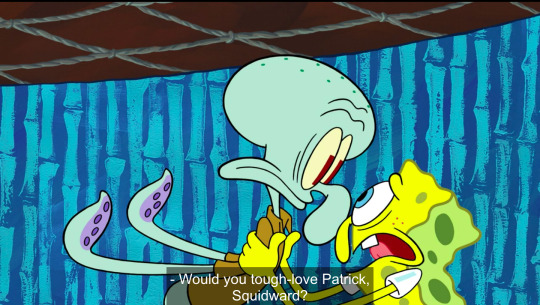
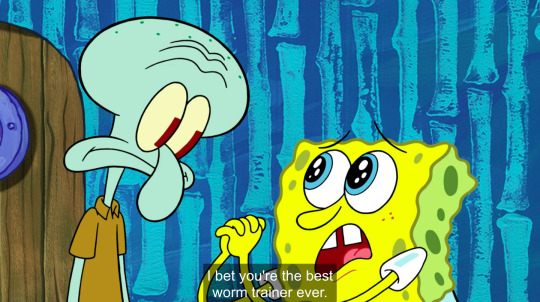

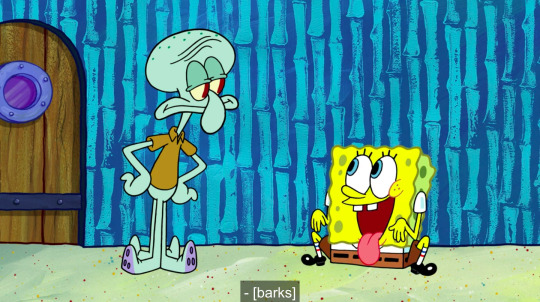
is it finally time to kinkshame these freaks or
#squidbob#sbsp#i am catching up on some of the season 13 episodes and ....... this was a LOT lmfao#episode is 'pat the dog' s13#squidward#spongebob#shmee spks
700 notes
·
View notes
Text
Turtles Catches Up With Old GMMTV: The Bad Buddy Rewatch Edition, Part 3a -- BBS and Asian Cultural Touchpoints
[What’s going on here? After joining Tumblr and discovering Thai BLs through KinnPorsche in 2022, I began watching GMMTV’s new offerings -- and realized that I had a lot of history to catch up on, to appreciate the more recent works that I was delving into. From tropes to BL frameworks, what we’re watching now hails from somewhere, and I’m learning about Thai BL's history through what I’m calling the Old GMMTV Challenge (OGMMTVC). Starting with recommendations from @absolutebl on their post regarding how GMMTV is correcting for its mistakes with its shows today, I’ve made an expansive list to get me through a condensed history of essential/classic/significant Thai BLs produced by GMMTV and many other BL studios. My watchlist, pasted below, lists what I’ve watched and what’s upcoming, along with the reviews I’ve written so far. Today, I offer the first half of the third (ha!) of five posts on Bad Buddy. I'll look today at themes that myself and fellow Asian fans of Bad Buddy have caught and related to in this wonderful show.]
Links to the BBS OGMMTVC Meta Series are here: part 1, part 2, part 3a, part 3b, and part 4
As a lifelong viewer of Asian dramas, and as an Asian-American myself, I know why I'm drawn to Asian dramas. We all have our reasons for belonging to this widespread fandom, whether you're watching queer or het Asian dramas, consuming Asian music, all of it.
What are my reasons? The first and foremost one is relatability. Especially in Asian dramas, I relate to the spoken and unspoken communication of the dramatic characters as they navigate life's highs and lows. I relate to the way Asian dramatic characters engage with their families, their partners, their children, their colleagues, the world and societies around them. I relate to the ways in which societies are drawn and constructed, to the economic and emotional pressures that characters face. As an American -- I don't fully relate to the majority of experiences that white American characters face dramatically, because I'm not a part of the majority. As an Asian? I get almost all of what Asians are going through in dramatic art (save for, say, Korean or Japanese historicals, ha — but I do indeed get Asian patriarchy and sexism).
I'm not queer -- I am a cishet Asian woman -- but what I appreciate about queer Asian media is, very often, the media's tendency to not be shy about the various and intricate ways that discrimination, sexism, trauma (intergenerational, emotional, etc.), and many more social and emotional phenomena interplay in an individual's life.
When I first watched Bad Buddy, I had the strong sense that what I was watching was incredibly relatable to much of my upbringing and life as a young adult, working out issues vis à vis my family and my eventual partner. Bad Buddy, thematically, captured a tremendous amount of the realities of everyday Asian life for young people.
Bad Buddy exists in the GMMTV bubble of No Homophobia (cc @bengiyo and @lurkingshan, as we have spoken about the GMMTV bubble). However, what Bad Buddy didn't shy away from were explorations of many other social/emotional/cultural themes and frameworks of everyday life, from sexism, to youth bias, to boundaries and enmeshment, and many, many more.
I wrote in my first-ever Bad Buddy thesis that the framework of intergenerational trauma was the main theme I identified -- and identified with -- in the show. But, as I was contemplating writing this series of Bad Buddy meta posts, I wanted to know: what did my fellow Asians pick up in this show that they saw, and that they related to? In other words: what makes Bad Buddy particularly special to Asian fans of the show?
So, I did a thing. I gathered together a few BBS Asian stans, like myself, for a lengthy (and still ongoing!) discussion about what we related to in Bad Buddy. I want to thank, from the bottom of my heart, @telomeke, @grapejuicegay, @recentadultburnout, @neuroticbookworm, and @lurkingshan (who's not Asian, but has Asian relatives, and gets us!) for being up for creating a spontaneous mini-village together to talk Bad Buddy and its inherent Asianness.
It sounds redundant to identify Bad Buddy, a show made by Thais and set in Thailand, as an "Asian" or "Thai" show. It's definitely not a show that steps back to take a look at itself and say, "oh hey, this is really 'Thai,' what we're doing here." When I asked @recentadultburnout directly about what they might have identified as uniquely Thai about Bad Buddy, RAB thought about it and said -- maybe Pat's ranak ek (Thai xylophone). Other shows of Aof Noppharnach's, including He's Coming To Me, Moonlight Chicken, and even the start of Last Twilight, highlight many facets of Thai life, from the spiritual to the everyday-cultural (even Gay OK Bangkok does this a bit, too). But Bad Buddy doesn't really go there by way of overt symbolism and/or specifically Thai spiritual/cultural practice.
The Asianness of Bad Buddy is far more inherent. It is rooted and coded in the way people interact with each other.
An overt example occurs in episode 10, when Dissaya confronts Ming in the Jindapat home, and announces that she will reveal Ming's secret, dropping the effort she has made her entire life to "save face" -- her reputation AND Ming's reputation.
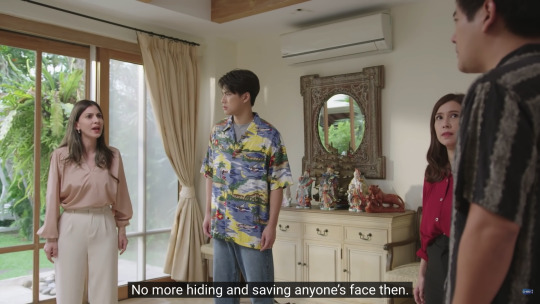
During my first Bad Buddy rewatch, I was so moved in fury by this scene that I had to blog about it as if I had never seen it before. There's so much encapsulated in this moment: the pressure that Dissaya has put on herself to keep the embarrassing secret that she lost a scholarship; the effort she made to keep Ming's theft of the scholarship a secret, to save his face, and the secrets she kept from Pran to save her face, and to keep up the façade of rivalry between the Jindapats and the Siridechawats. She was letting a whole hell of a lot loose in this moment, because the eternal pressure of saving face in Asian societies is, frankly, never-ending.
"Saving face" is an incredibly important notion in many Asian collectivist cultures. Saving face is about an individual or a family projecting an image of calm, cool collectedness and success, in order to not make waves within a collectivist society for any reason. If you are not working to seem like you are going with the flow of life, if you're not keeping up with the Joneses, the Kardashians, whoever -- you are not saving face. If you are in poverty, and are projecting an image of poverty, instead of pretending to be more wealthy than you are -- you are not saving your face or your family's face. If you allow yourself to get publicly defeated -- you are not saving face. Dissaya gave up a lot of her hard-earned reputation in the moment she confessed the truth in front of Pat and Pat's mother.
My Asian friends and I can click wordlessly into understanding the pressure of saving face; say that I didn't get good grades in school? I wouldn't be saving my parents' face. This kind of pressure to keep up with particular social dynamics within and external to family, within Asian societies, is a neverending drumbeat of pressure.
Besides saving face, there are many other Asian cultural touchpoints that were contained within Bad Buddy that my fellow Asian BBS stans and I noted. They include:
1) intergenerational/inherited trauma,
2) the unique nature of secret-keeping in Asian cultures/societies,
3) enmeshed family boundaries,
4) setting up children to compete against each other for the sake of familial pride,
5) patriarchy, sexism, and the reversal of sexism among next generations,
6) the inset/assumed roles of family members based on patriarchy and elder respect,
7) Assumed community within and external to one's family, usually based on where you live and where you go to school,
8) How one's identity is defined based on patriarchy and individualist vs. collectivist cultures,
9) How various cultures within an Asian nation live peacefully (or not) together (for example, what makes Pat and Pran different by way of Pat's Thai-Chinese heritage vs. Pran's ethnic Thai heritage),
and many, many more.
It'll be impossible, even over two posts, to analyze all of these cultural touchpoints, but a few of them engendered quite a bit of conversation among the BBS mini-village that I want to highlight. In this post, I'll focus on the continuation of my first BBS thesis on intergenerational/inherited trauma, the nature of secret-keeping in Asian societies, and will return briefly to the touchpoint of saving face.
One of the most devastating scenes for me in Bad Buddy is in my favorite episode, episode 10, when Pat (after he's learned, throughout the episode, of the extent of the lies that his and Pran's family have shared with their children) confronts his father about his father's demands to literally control Pat's emotions, the way in which Pat related to other people -- specifically Pran. Pat sums up a lifetime's worth of control in one sentence.
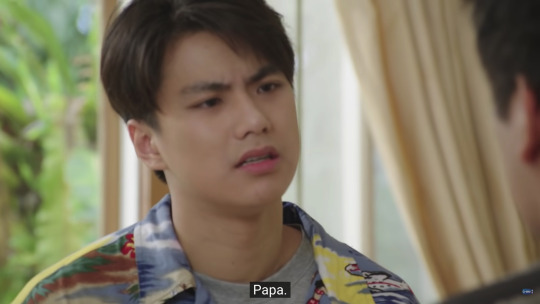
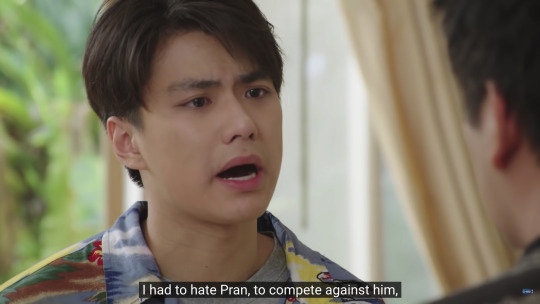
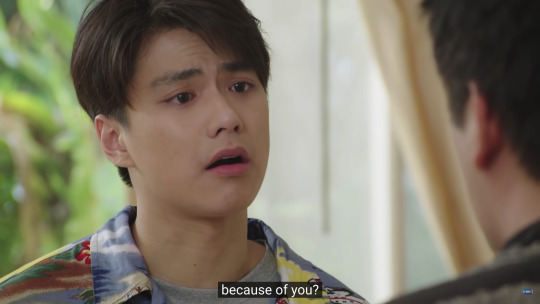
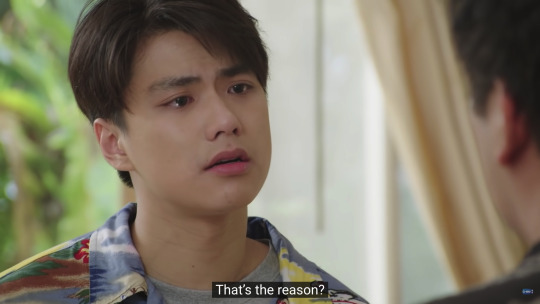
@telomeke noted in our ongoing group conversation that this notion of inherited trauma vis à vis Ming is particularly present in Asian societies, not just by way of familial expectation that we, as Asians, embody it and "take it" throughout our generations, as Pat realized up above -- but that ALL family members present are responsible for playing their roles within the framework of the inherited trauma. @telomeke noted in particular that exactly what Pat was doing to hate Pran, FOR his father? That was what Ming HAD to do for MING'S dad, when Ming schemed to get the scholarship from Dissaya. AND, Pat's mother, in consoling Pat, had to play the role of explainer -- which, as we know now, Pat ran away from to meet his beloved Pran on the rooftop before running away to the eco-village.
Pat running away from that moment? That was a huge symbol of the breaking of the inherited trauma that was given unto him by his parents both.
(@telomeke has actually written about their theory about how the Jindapats and Siridechawats ended up living next door to each other -- which seems SO STRANGE on the surface, consider Ming's and Dissaya's boiling hatred for each other -- and the theory links nicely within the framework of inherited trauma. Tel theorizes that Ming's father or grandfather may have actually gifted the house to Dissaya's family as a means of apologizing for Ming's deceit. In which case: the presence of the Siridechawats is a reminder, on an everyday basis, of Ming's folly to steal from Dissaya, which may explain why Ming in particular went so hard on Pat to triumph daily over Pran.)
We as a group unwound quite a bit on the nature of secret-keeping in Asian cultures. We know Bad Buddy relies on this cultural touchpoint at the end of the series: Pran and Pat have a full-fledged and committed relationship as a transparent secret, under the noses of Pat's and Pran's parents.
Secret-keeping....oh, man. I could not have lived a fully authentic life in America if I didn't keep a million secrets from my family while I was living out my own independent choices. I actually, literally, could not have gotten married, because the rule of my household was that I wouldn't date. I would just... get engaged. So I'd get engaged through, what, magic? Match-making? No: I'd have to find my partner through my own battle of social and familial conventions, literally against my family, to get to where I wanted to be in life, which was (gasp) married.
@neuroticbookworm illuminated more on this particularly from our shared Indian lens. She wrote,
Keeping your relationship secret from parents is sooooo ridiculously common in India (and I'm sure we can extrapolate to other Asian countries like Thailand). And the justification the children give themselves is always rooted in how they have a "duty" towards their parents, and that they will reveal their relationship after they have fulfilled their duties.
God, I LOVED that NBW brought up "duty" in this conversation. Because! Assumed within the coded language from Asian parents to children, and vice versa, is a sense that children MUST follow the dictates of their parents. 100%, full-stop.
The duties that NBW clarified in this particular conversation specified life demarcations such as "[w]hen I graduate, I'll tell my parents about my partner," and "[w]hen I graduate and get a job and can financially support myself in life, I'll tell my parents about my partner."
What's coded in these statements is a fear that the children will have to reveal to their parents that they were disobedient in the rules their parents set, that no dating shall occur until the time at which the parents rule it's okay. And at least within Indian frameworks, that period of it being "okay" is, more often than not, the period in which arranged matches are examined. Because, yes, that's still the rule in the high majority of Indian culture.
The revelation of that disobedience? That's bad-news bears. It indicates... everything: a lack of loyalty to the family; a lack of understanding the meaning of a child's role to listen to the parents as the parents are elders and therefore are the moral authority of the household; a lack of self-control (which is a huge deal -- that relates to saving face on behalf of the family); a lack of understanding the morals and ethics of saving oneself, in love and sex, before marriage, etc. Even if a family seems fully progressive on the outside, as an Asian, I'm conditioned to question that progressiveness -- as parents may hold different standards of acceptance for their children vs. other young people.
@telomeke expanded on disobedience for us -- connecting it back to the very important notion of "saving face."
I think there's something quite related to secret-keeping, but it's also to do with the ability of Asians, but also human beings in general, of being able to live with duality in life... and secret-keeping is part of it. This also ties in to the East and Southeast Asian preoccupation with the concept of "saving face" [as noted above]. A lot of families are able to live with the knowledge of dirty secrets, unsavory truths, as long as it's not brought into the light and confronted. I'm constantly reminded of this whenever I rewatch BBS Ep. 12 because it's clear both Ming and Dissaya KNOW their sons are in a relationship but it's not overtly admitted. In that way they (and more Ming I suppose) get to "save face" and not have to deal with the truth that their sons are being disobedient, consorting with the enemy, and because it's not in the open -- there is no dishonor brought to the family and to the elders.
God, I love the way Tel put this. That disobedience on the part of Pran and Pat would actually bring dishonor to their families -- because their families have put SO MUCH EFFORT into building their public AND private enmity their entire lives! It affected Chai's relationship with the families as an employee of both families. EVERYONE AT PAT'S AND PRAN'S SCHOOLS knew the guys were the "legendary rivals." And, of course, by being in rival faculties at the same university, the boys could continue this public enmity as well -- keeping up with the roles that were literally assigned to them by their parents.
If the boys disobeyed, they would bring dishonor to their families. Think about that -- and connect that with the heaviness that Pran walked away with after the rooftop kiss in episode 5, AND the weight of Pran's breakdown at the end of episode 10, when Pat assured him that they would run away together.
No matter what a Western viewer (and maybe even Asian viewers, wanting to see a dismantling of these paradigms) would want Pat and Pran to have by way of full openness of their relationships with everyone in their lives (because, in individualistic cultures, that self-driven openness is a given), Pran and Pat themselves knew that that couldn't be their reality vis à vis the social worlds they belonged to. So they kept their relationship a secret, in the end.
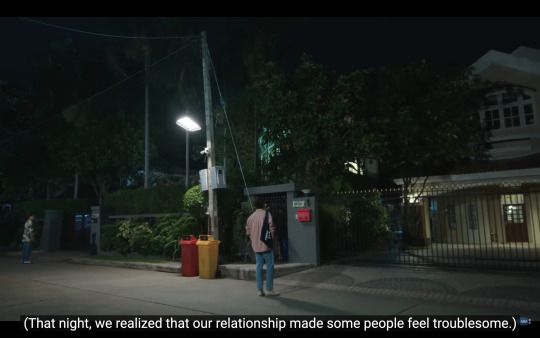
The secret that Pran and Pat keep about their relationship is strategic. It's certainly also a stress point: an older Pat asks an older Pran, at the end of episode 12, if he'll ever be able to walk through the front door of the Siridechawat house.
But this is the compromise -- within the larger-scale culture of secret-keeping in Asian societies, AND the private frameworks of the enmity that Dissaya and Ming established between themselves and their families years and years prior -- that will work best for Pat and Pran to preserve the sanctity of their relationship, which I talked about in part 2 of this meta series.
Pran and Pat do not have to publicly appear disobedient to the demands and pressures of their families. They do not have to make their families engage with each other. They do not have to make their families confront the mistakes that their parents made earlier in their lives. They can protect their families from their private and public follies. They can help their families keep and save face. And by doing all that? They can prevent their relationship from being threatened.
I feel this very deeply in my heart as an Asian-American. For the sake of my American spouse, I wanted to protect him from a lot of these pressures, and so I insisted on keeping a lot of our relationship secret from my folks. If I demanded full-blown, public acceptance from my parents? If I brought my "boyfriend" to parties, and introduced him as such with aunties and uncles -- especially if it wasn't indicated that we'd be permanent one day? Damn. No. I'd be embarrassing my folks, with the aunties and uncles saying to my folks, "dang, you can't control your daughter, huh? You let her do what she wants." That would mean my parents would lose face over their ability to control the lives of their children, and that's no bueno in our cultural terms. It would be on ME, as THEIR child, to uphold THEIR ability to save face, as much as its their own work.
Dissaya refers DIRECTLY to Pran doing this FOR HER when, in episode 10, she asks him, "did you forget to save my reputation?" It's brutal, daily work. And Pran goes BACK to keeping secrets in the end, because it would have been impossible, ultimately, for Dissaya to save face, AND for Pran to save Dissaya's reputation/face, if Pran were out with his relationship with Pat, thus proving his disobedience. It would be -- JUST -- better to keep the secret for all those involved.
As this post has gotten long, I'm going to continue talking more about these touchpoints in a second post. I'm driven to talk about this because I think much of the Western fandom might miss what us Asians are reading into shows like Bad Buddy through this coded language and engagement. I very much posit that Bad Buddy -- while it is first and foremost a queer show, made by queer Asians, about queer young men -- is so relatable to so many of us because we've faced similar struggles of survival, and we've faced threats to the sanctity of the love we have for other people by way of needed to fit into the roles set before us by previous generations.
So! With that, thank you for reading, and see you tomorrow, when I focus on competition, enmeshed family boundaries, patriarchy and sexism in Bad Buddy, and more if I can fit it in!
(Tagging @dribs-and-drabbles, @solitaryandwandering, and @wen-kexing-apologist by request! If you'd like to be tagged, please let me know!)
[Alright! Stay tuned for more, many more ruminations from the BBS Asian station tomorrow!
Here's the status of the Old GMMTV Challenge watchlist. Tumblr's web editor loves to jack with this list, so mosey on over to this link for the very latest version!
1) The Love of Siam (2007) (movie) (review here)
2) My Bromance (2014) (movie) (review here)
3) Love Sick and Love Sick 2 (2014 and 2015) (review here)
4) Gay OK Bangkok Season 1 (2016) (a non-BL queer series directed by Jojo Tichakorn and written by Aof Noppharnach) (review here)
5) Make It Right (2016) (review here)
6) SOTUS (2016-2017) (review here)
7) Gay OK Bangkok Season 2 (2017) (a non-BL queer series directed by Jojo Tichakorn and written by Aof Noppharnach) (review here)
8) Make It Right 2 (2017) (review here)
9) Together With Me (2017) (review here)
10) SOTUS S/Our Skyy x SOTUS (2017-2018) (review here)
11) Love By Chance (2018) (review here)
12) Kiss Me Again: PeteKao cuts (2018) (no review)
13) He’s Coming To Me (2019) (review here)
14) Dark Blue Kiss (2019) and Our Skyy x Kiss Me Again (2018) (review here)
15) TharnType (2019-2020) (review here)
16) Senior Secret Love: Puppy Honey (OffGun BL cuts) (2016 and 2017) (no review)
17) Theory of Love (2019) (review here)
18) 3 Will Be Free (2019) (a non-BL and an important harbinger of things to come in 2019 and beyond re: Jojo Tichakorn pushing queer content in non-BLs) (review here)
19) Dew the Movie (2019) (review here)
20) Until We Meet Again (2019-2020) (review here) (and notes on my UWMA rewatch here)
21) 2gether (2020) and Still 2gether (2020) (review here)
22) I Told Sunset About You (2020) (review here)
23) YYY (2020, out of chronological order) (review here)
24) Manner of Death (2020-2021) (not a true BL, but a MaxTul queer/gay romance set within a genre-based show that likely influenced Not Me and KinnPorsche) (review here)
25) A Tale of Thousand Stars (2021) (review here)
26) A Tale of Thousand Stars (2021) OGMMTVC Fastest Rewatch Known To Humankind For The Sake Of Rewatching Our Skyy 2 x BBS x ATOTS (re-review here)
27) Lovely Writer (2021) (review here)
28) Last Twilight in Phuket (2021) (the mini-special before IPYTM) (review here)
29) I Promised You the Moon (2021) (review here)
30) Not Me (2021-2022) (review here)
31) Bad Buddy (2021-2022) (thesis here)
32) 55:15 Never Too Late (2021-2022) (not a BL, but a GMMTV drama that features a macro BL storyline about shipper culture and the BL industry) (review here)
33) Bad Buddy (2021-2022) and Our Skyy 2 x BBS x ATOTS (2023) OGMMTVC Rewatch (The BBS OGMMTVC Meta Series is ongoing: preamble here, part 1 here, part 2 here, more reviews to come)
34) Secret Crush On You (2022) (on pause for La Pluie)
35) KinnPorsche (2022) (tag here)
36) KinnPorsche (2022) OGMMTVC Fastest Rewatch Known To Humankind For the Sake of Re-Analyzing the KP Cultural Zeitgeist
37) The Eclipse (2022) (tag here)
38) GAP (2022-2023) (Thailand’s first GL)
39) My School President (2022-2023) and Our Skyy 2 x My School President (2023)
40) Moonlight Chicken (2023) (tag here)
41) Bed Friend (2023) (tag here)
42) Be My Favorite (2023) (tag here)
43) Wedding Plan (2023)
44) Only Friends (2023) (tag here)]
#bad buddy#bad buddy meta#bad buddy the series#bad buddy the series meta#backaof noppharnach#aof noppharnach#ohmnanon#ohm pawat#nanon korapat#patpran#pat x pran#pran x pat#the bbs ogmmtvc meta series#turtles catches up with old gmmtv#the old gmmtv challenge#ogmmtvc#turtles catches up with thai BLs#turtles catches up with the essential BLs#asian intergenerational trauma#intergenerational trauma#asian themes in bad buddy#saving face in asian cultures#asian cultural touchpoints in bad buddy
63 notes
·
View notes
Text
Hum...
#im just thinking... im okay tho /gen#just thinking about the words the bestie said to me after I told him about my mental health...#particularly a phrase... he just said 'you are already committed' and when i asked what he meant he said 'to life'#its just... idk... it was impressive and had such a weird feeling... sadly i guess i am committed........ 'sadly' huh....#sigh another important thing was that it was crucial i went back to therapy... i dont really want to tho...#but 'youve been feeling like this for a long time you need help' ... sigh... what i need is...#the future is so scary... sigh... okay#ill put an alarm to wake up earlier tomorrow and work on that!#seari talks#what i need is adderall- jsjsjsjsjs yeah... alr im sleepy time to mimir#tomorrow ill catch up with everything i missed too#also if anyone reads this dont worry pretty person! i got a bit scared/upset up there but its okay#im quite stable right now! at least enough to survive for a couple days! so yup!#miiiight have to look up a new therapist tho... since aside from help i wanna get a diagnosis....#sigh... but okay that's not for rn seari it's for future seari. rn seari has to go mimir because shes tired#a mimir a mimir pat pat pat
13 notes
·
View notes
Text
i wish i had the words to explain what yoongi and his d-day did for my mental health this year. i really wish i had the power to somehow let him know that i related to every word he said in that album and everything he spoke about in his documentary, and that his wisdom and reassurances really pushed me forward like nothing else all these months. ugh i wish.
#bc i was listening to snooze and just every single word hits so hard i can't listen to it without crying#he keeps promising us that he's here to catch us n that we should hold onto our dreams n that there's SOMEONE who lives off our smiles#and then the mantra styled 'everything will be okay' over n over again like a pat on ur head or a soft hug#d-day is truly for all the sad girlies who are trying to get up again.. who are wiping their tears and trying to heal#even the freaking interlude feels like pulling yourself out of your pains and steering towards a better future.. so utopian#and remember what he said at the end of road to d-day? how we can't control the past and future but the present#i cried SO MUCH ISGDHSEHFUFH and ill cry again bc that hit home.. really did#yeah idk i just hope he knows what that album means to us and i hope he knows how much comfort he's able to give#hands down my favourite album this year and truly truly did so much for me seriously#okay that's it
23 notes
·
View notes
Text
I wrote one (1) sentence today! :D

#firealder thoughts#chapter 170#*pats myself on the back*#this is what getting your wisdom teeth out does#you lack motivation#then when i do get motivation#it transfers into another fic#*cough cough* my hunger games toa au fic *cough cough*#and that au is planned out to the end of catching fire#and parts of the plot of mackingjay part 1 are cooked up right now#Lolling I wanna tell u#hmm....#let me know if sending u the doc is good#i got IDEAS
8 notes
·
View notes
Text
Nepeta: :33< just accidentailly said 'sensory overlord' instead of overload today in therapaw
Nepeta: :33< new neurodivergent final boss just dropped
#homestuck#incorrect homestuck quotes#nepeta leijon#mod terezi#the claws do eh damage but they have nice bleed potential and a critical multiplier which makes them somewhat viable#unfortunately they also require you to be uncomfortably close up for them to be effective and my dodge skills are not quite there yet#oh yeah i'm talking about the same dark souls 3 soul level one run#i'm almost done with it i just got gael and midir left and tbh i'm having a much easier time with gael than sister friede#but he always throws in a curveball that i don't quite catch in time#but i've gotten him down to like 15% health in the dozen tries i've done him so i'm feeling good about this state of affairs#and i've got midir pretty down pat so i think i'm doing pretty good#oh yeah i also named my character for this run feferi 38)#look i'm love her so much you guys do not get it
112 notes
·
View notes
Text
the marnus labuschagne energy is unparalleled and I want it
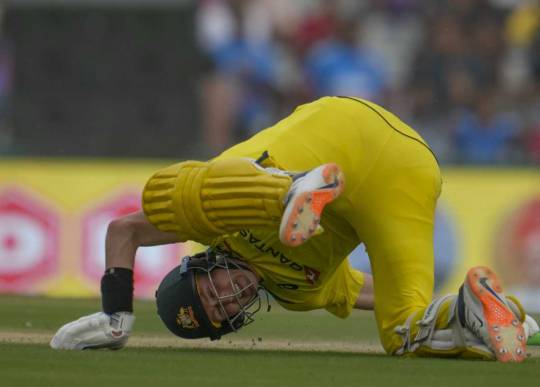



#marnus labuschagne#unbridled golden retriever energy#two catches and one run out in today's match#cost pat one review because he is a ball of energy and is likely to shout HOZZZATT to a half appeal from the wk#don't listen to marnus pat xd#always hyped as fuck when fielding#gets into the wc squad as a concussion sub (again)#he will always be there to hype his mates up and boost morale and most importantly HIMSELF#YES MARNIEEE#cricket australia#cricket#cwc 2023#cricfam
10 notes
·
View notes